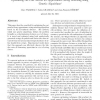Free Online Productivity Tools
i2Speak
i2Symbol
i2OCR
iTex2Img
iWeb2Print
iWeb2Shot
i2Type
iPdf2Split
iPdf2Merge
i2Bopomofo
i2Arabic
i2Style
i2Image
i2PDF
iLatex2Rtf
Sci2ools
118
click to vote
PR
1998
1998
Optimizing the cost matrix for approximate string matching using genetic algorithms
This paper describes a method for optimizing the cost matrix of any approximate string matching algorithm based on the Levenshtein distance. The method, which uses genetic algorithms, de
nes the problem formally as a discrimination between a set of classes. It is tested and evaluated using both synthetically generated strings of symbols and chain code data extracted from the international Unipen database of online handwritten scripts. Experimental results show that this approach can e
ectively discover the hidden costs of elementary operations in a set of string classes.
Related Content
| Added | 23 Dec 2010 |
| Updated | 23 Dec 2010 |
| Type | Journal |
| Year | 1998 |
| Where | PR |
| Authors | Marc Parizeau, Nadia Ghazzali, Jean-François Hébert |
Comments (0)

